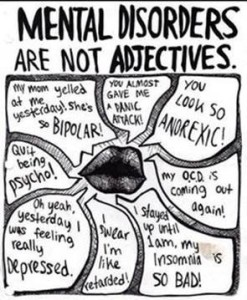You are NOT Your Mental Illness
The initial phone calls I receive from clients are ones with hushed voices or sometimes tears. Most people don’t even call, they opt for e-mailing instead. This got me thinking or should I say hoping that one day people will be able to freely have that conversation with a therapist just like they would a back doctor without the shame or stigma attached.
One of the most memorable moments in my training as a therapist was when I was an intern during the summer between my junior and senior years of college. I was working in a partial hospitalization program at a local hospital. While I was observing a group psychotherapy session, all of a sudden the therapist slammed his hand down on the table and said (in a very loud voice) “NO! You are NOT bipolar. Bipolar disorder is something you have, NOT something you are and since you have it you can manage it. The fact that you have bipolar disorder does not and should not define who you are as a person.” That moment really stuck with me and still does to this day.
So often, we use mental illness as an adjective or a word that describes a noun (usually ourselves or another person) when in fact if you look up “anxiety” in the dictionary it states “noun 1. a feeling of worry, nervousness, or unease, typically about an imminent event or something with an uncertain outcome.” or “depression” as “noun 1. the state of feeling sad.” Sure, depressed is technically an adjective. But I hope you see my point here. When did society start defining themselves by their current mental state and making it more of a permanent attribute when it really is not? People already define themselves by their current careers, much to their detriment. I can only imagine the harm defining yourself by your current mental state. It leaves very little room for flexibility (career-wise or mental-state wise!) to even think of yourself in any other way.
I like to do my part in separating clients from their mental illness (making it a noun and not an adjective) and I correct them when they say “I am depressed” by saying “You have depression” or “You are experiencing anxiety” rather than “I am anxious.” I also give this little word game as homework to clients so that they can start the shift and start seeing their current mental state as temporary and not something that has to define them. Hopefully people will soon reference mental illness like they do physical illness “I have a backache” “I have a cold” “I have anxiety.” I have never heard anyone say “I am a backache.”
Hopefully this post leaves you with the take-home that one’s current mental state does not have to define him or her. It’s as simple as switching a few words around in your lexicon to begin making that change.




